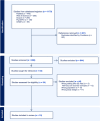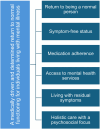Conceptualisation of Mental Health Recovery by Health Professionals and Students in Southeast Asia: A Qualitative Systematic Review and Meta-Aggregation
- PMID: 39960097
- PMCID: PMC12056462
- DOI: 10.1111/jpm.13158
Conceptualisation of Mental Health Recovery by Health Professionals and Students in Southeast Asia: A Qualitative Systematic Review and Meta-Aggregation
Abstract
Introduction: While the recovery approach is gaining recognition in non-Western countries, it remains underexplored in Southeast Asia. This study addressed this gap by examining how health professionals and students conceptualised recovery, providing insights for enhancing mental health practices.
Aim: To synthesise how health professionals and students in Southeast Asian countries understand mental health recovery.
Methods: A search across CINAHL, MEDLINE, PsycINFO, Scopus, and the Web of Science identified ten qualitative studies (2006-2024). Data extraction, quality appraisal, and synthesis were conducted following the JBI methodology.
Results: The findings highlighted a medically driven and determined return to normal functioning for individuals living with mental illness. This was classified into six categories: return to being a 'normal person', symptom-free status, medication adherence, access to mental health services, living with residual symptoms, and holistic care with a psychosocial focus.
Discussion: Medical-oriented practices have dominated mental health care, creating a power imbalance. Training, education, culture, socioeconomic status, and stigma have shaped the understanding of recovery.
Implications for practice and recommendations: Shared decision-making and formal training prioritising lived experiences are vital to reducing power imbalances. A shift towards recovery-oriented approaches is critically needed to enhance mental health practices in Southeast Asia.
Keywords: international issues; mental health; recovery; staff perceptions; systematic literature reviews.
© 2025 The Author(s). Journal of Psychiatric and Mental Health Nursing published by John Wiley & Sons Ltd.
Conflict of interest statement
The authors declare no conflicts of interest.
Figures
Similar articles
-
Health professionals' experience of teamwork education in acute hospital settings: a systematic review of qualitative literature.JBI Database System Rev Implement Rep. 2016 Apr;14(4):96-137. doi: 10.11124/JBISRIR-2016-1843. JBI Database System Rev Implement Rep. 2016. PMID: 27532314
-
Mental health recovery for people with schizophrenia in Southeast Asia: A systematic review.J Psychiatr Ment Health Nurs. 2023 Aug;30(4):620-636. doi: 10.1111/jpm.12902. Epub 2023 Feb 5. J Psychiatr Ment Health Nurs. 2023. PMID: 36681884
-
The experience of healthcare professionals implementing recovery-oriented practice in mental health inpatient units: A qualitative evidence synthesis.J Psychiatr Ment Health Nurs. 2024 Jun;31(3):287-302. doi: 10.1111/jpm.12985. Epub 2023 Oct 8. J Psychiatr Ment Health Nurs. 2024. PMID: 37807633
-
The use of Open Dialogue in Trauma Informed Care services for mental health consumers and their family networks: A scoping review.J Psychiatr Ment Health Nurs. 2024 Aug;31(4):681-698. doi: 10.1111/jpm.13023. Epub 2024 Jan 17. J Psychiatr Ment Health Nurs. 2024. PMID: 38230967
-
How lived experiences of illness trajectories, burdens of treatment, and social inequalities shape service user and caregiver participation in health and social care: a theory-informed qualitative evidence synthesis.Health Soc Care Deliv Res. 2025 Jun;13(24):1-120. doi: 10.3310/HGTQ8159. Health Soc Care Deliv Res. 2025. PMID: 40548558
Cited by
-
Supporting healthcare in rural communities in Thailand: An exploratory qualitative study to understand the role and current mental health practices of village health volunteers.PLoS One. 2025 Mar 27;20(3):e0320559. doi: 10.1371/journal.pone.0320559. eCollection 2025. PLoS One. 2025. PMID: 40146743 Free PMC article.
-
Lived experiences of recovery among persons with schizophrenia in Thailand: A qualitative study.Belitung Nurs J. 2025 Aug 3;11(4):452-458. doi: 10.33546/bnj.3885. eCollection 2025. Belitung Nurs J. 2025. PMID: 40766259 Free PMC article.
References
-
- Alhamidi, S. A. , and Alyousef S. M.. 2020. “Exploring the Perceptions of the Multidisciplinary Team in Mental Health Toward Recovery of Mental Health in Saudi Arabia.” Journal of Human Behavior in the Social Environment 30, no. 7: 905–917. 10.1080/10911359.2020.1770659. - DOI
-
- American Psychiatric Association . 2013. Diagnostic and Statistical Manual of Mental Disorders: DSM‐5. 5th ed. American Psychiatric Publishing. 10.1176/appi.books.9780890425596. - DOI
-
- Anthony, W. A. 1993. “Recovery From Mental Illness: The Guiding Vision of the Mental Health Service System in the 1990s.” Psychosocial Rehabilitation Journal 16, no. 4: 11–23. 10.1037/h0095655. - DOI
-
- Anthony, W. A. 2000. “A Recovery‐Oriented Service System: Setting Some System‐Level Standards.” Psychiatric Rehabilitation Journal 24, no. 2: 159–168. 10.1037/h0095104. - DOI
Publication types
MeSH terms
LinkOut - more resources
Full Text Sources
Medical
Miscellaneous



